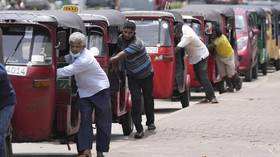Prime minister resigns amid mass protests in Sri Lanka — Analysis

The resignation of Mahinda Rajapaska (Prime Minister) in Sri Lanka came after several months’ worth of violence. In the face of skyrocketing inflation, many Sri Lankans have been forced to live in poverty as a result. The country defaulted on foreign debt payments.
According to media reports, Rajapaska gave his resignation as his younger brother to President Gotabaya Rajapaksa. The resignation dissolved Rajapaska’s cabinet, which was only formed last month after all of the previous cabinet members resigned.
Sri Lanka has seen more than two consecutive months of protests. This unrest continued on Monday. Shortly before Rajapaska’s resignation, pro- and anti-government demonstrators clashed outside government buildings in the capital of Colombo, and police used tear gas and water cannons to break up the melee.
To quell unrest in Colombo, hundreds of soldiers were stationed and enforced a curfew. That curfew was broadly ignored, however, and at least 76 people were injured in Monday’s clashes, the Times of India reported. According to another report by AFP, a legislator from Rajapaska’s party was found dead on the outskirts of Colombo after he allegedly opened fire on protesters blocking his car.

Inflation rose to almost 30% in April, resulting in Sri Lanka experiencing shortages in fuel, food and medicines. The introduction of fuel rationing last month led to long queues at the pumps for basic staples like rice, milk powder and other medical supplies.
Rajapaska’s government announced in April that it would halt payments on its foreign debt, with Central Bank Governor Nandalal Weerasinghe explaining that the country had to use its dwindling reserves to import food and fuel instead. Sri Lanka was due to pay some $7 billion of its foreign debt this year, but Finance Minister Ali Sabry announced last week that the country’s reserves had fallen to below $50 million.
The financial and humanitarian crisis has been blamed by the government on the Covid-19 pandemic, which cut into the island nation’s revenue generated by tourism. High government spending, tax cuts, and high state debt led to a reduction in the state’s coffers. Meanwhile, attempts to print money to repay foreign bonds caused inflation to soar.
It is unclear whether Rajapaska’s resignation will calm aggrieved citizens. According to AP, trade unions called Monday for a week-long protest culminating with a march on parliament demanding that President Gotabaya Rajapaksa resign.
This story can be shared on social media
[ad_2]







